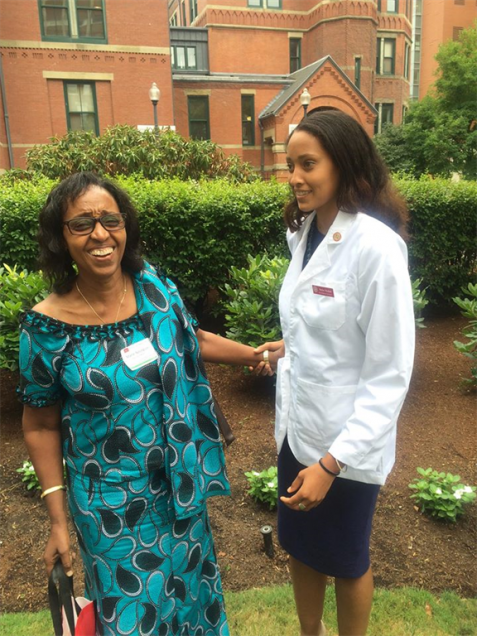Martine Randolph, MD, (MED’20)
Specialty Interests
FamPrac
What is special to you about BUSM?

Boston Medical Center is a palace to me. I become a happier person as soon as I walk into the building. It often makes me think of the Gandhi quote that “Happiness is when what you think, what you say, and what you do are in harmony”. I didn’t expect to find that during medical school — I thought it would be more about getting the technical know-how, which it is, but starting off my medical training at BMC and BUSM has been much more than that. BMC feels like its own village made up of people from different backgrounds whose skills and life experiences are strengths towards achieving our common goal of serving the city of Boston. The mission isn’t new and it isn’t up for change and I’ve felt incredibly uncomplicated pride to be a part of this institution.
How do you spend downtime or what do you do for wellness?
The conversation about wellness has thankfully evolved over the last few years towards encouraging every person to define it for themselves. I struggled to find the time and creativity for hobbies during the first 3 years of med school and don’t feel like I’ve bounced back yet. I have never felt comfortable spending money without an income, so I shied away from things that have startup costs. What I did for my own wellness was commit to putting my relationship first. I frankly knew I needed more time than the average student to study and that was OK. And my partner’s schedule didn’t always match up with mine, which was unfortunate. So our wellness has looked pretty quiet: not too many big adventures but the steadiest and most fulfilling support that I could have hoped for.
Most memorable patient interaction?
I have continued to think a great deal about a patient that I helped take care of as a sub-I. This patient was very sick and had been for a long time, but it took me a while to get that. I spent days worrying about his deteriorating condition, and then days searching for a way to change the direction things were going in and all that worry really ate me up. I remember when we called for a renal consult and Dr. Borkan came by our workroom. He saw the tears I was trying to fight back and took the time to gently explain the bigger picture that our patient was facing and gave me a version of a family meeting talk that I didn’t know I needed to hear. We were able to speak with the patient’s family about end of life care and they decided to change his code status the night before he passed.
What has been an unexpected experience or revelation?
With the patient story told above, I had my favorite attending tell me to protect myself emotionally or I ran the risk of burning out. It took me by surprise because I have believed with every fiber of my being that providers who allow emotions in make better clinicians. But when she said it, I took stock of how my body, mind and heart were doing and I was really exhausted. I don’t think she was telling me to become stoic by any means, I think she was just looking over at her med student and seeing how I was feeling and how hard it was to lose a patient. It made me realize that I have a long journey ahead of me.
What’s it like to live in the MSR?
I linked to BUSM through my postbac program, so I didn’t actually know that I would be matriculating until my MCAT scores came out during the summer before we started. The MSR was the perfect choice for me as a result because all I had to do was just bring my stuff to Boston and get started, rather than taking the time to find a place and buy furniture on a tight timeline. It really was one of the softest landings I’ve experienced in a new city!
What unexpected challenges have you faced as a medical student and how’d you overcome them?
We ALL experience imposter syndrome. I felt like I wasn’t worthy of being a physician right from the start. I felt like I stuck out as a racial minority first-generation doctor and felt like my failures would be very public and disappointing. I worried a lot about making too much of my role as a student to patients whose health was much more important than my learning. But along the way, I found mentors who made me feel seen within the world of med school. And then towards the end of my 3rd year, I realized I was tired of comforting comments when I mentioned my imposter syndrome to friends or preceptors because the conversation felt like a broken record. I couldn’t immediately change my imposter syndrome, but I decided to stop volunteering it. That has forced me to think differently.